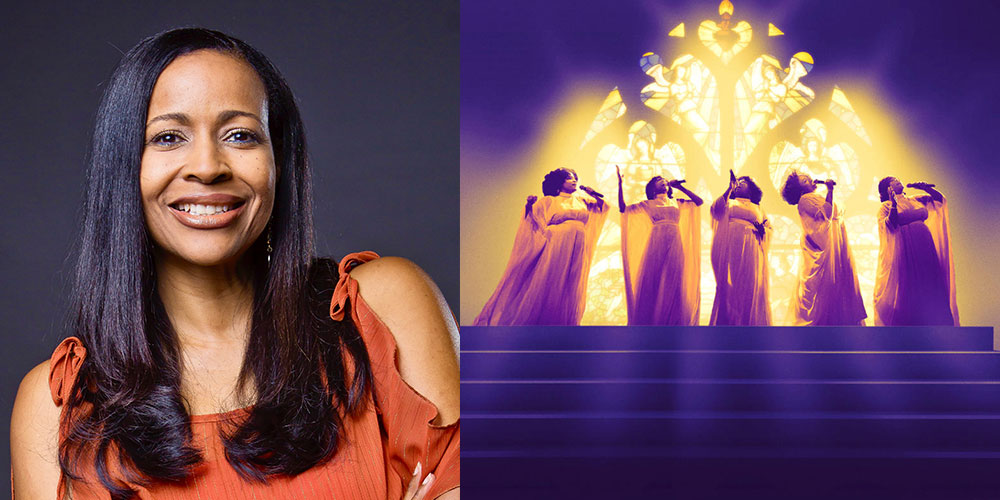
Last week, screenwriter and director Camille Tucker (MFA ’18), co-writer of the hit Lifetime biopic The Clark Sisters: First Ladies of Gospel, shared insights from her over 15 years of experience optioning screenplays and TV pilots to major studios such as Sony, Disney, Universal, Fox TV, and New Line Cinema. Joining her in conversation was SFTV professor and fellow screenwriter Michelle Amor Gillie and the pair covered everything from longevity in the business to what Hollywood can do to uplift Black creators.
On The Clark Sisters journey
Tucker saw early success as a screenwriter, but the journey from selling her first script to the success of The Clark Sisters was hardly overnight. She was first approached in 2005 for the project and would pitch it every few years without luck. “[Being a professional screenwriter] is an endurance game,” Camille shares, “that’s why you can’t hinge everything on one project in this industry.”
Even after a successful first few years at Disney, Tucker decided to take a step back from the stresses of Hollywood to focus on herself. That’s why she encourages all her students to make self-care a priority. “Spiritually, where do you go when you feel rejected or uncreative?” she asked and advised aspiring writers to have something outside the industry to lean into. As for Camille? She credits her faith for keeping her grounded. Hailing from a family of educators, Tucker eventually found herself teaching screenwriting at Biola University. “Teaching screenwriting brought me back to what I really love. I was back in the flow.”
Doors for The Clark Sisters began to open up after executive producer Queen Latifah came on board. By the time the TV movie was underway at Lifetime, the project boasted all Black women above the line. The now much-buzzed-about story of the highest-selling female gospel group in history was directed by Christine Swanson, written by Camille Tucker and Sylvia L. Jones, executive produced by Queen Latifah, Mary J. Blige, and Missy Elliott and starred Emmy-nominated Aunjanue Ellis.
The result is Lifetime’s highest-rated movie since 2016. With over 13 million views to date, it’s also the highest-rated original movie of 2020 and is nominated for six Black Reel Awards for TV. Yet the length of time it took to get the project from idea to smash hit doesn’t seem to bother Tucker. In fact, she gently warned the students listening, it’s common in this line of work. She advised them to always have several projects going at the same time, citing timing–both in terms of the project’s advocates and audiences–as major factors in its ultimate success. “Be passionate about the projects,” she says, “but wear them loose enough to pick them up and put them down.”
Advice to aspiring screenwriters
“There’s a way to receive feedback without compromising your vision,” Tucker states without hesitation. “Sit with the note and dig into what it really means. Build up those muscles.” Speaking directly to the SFTV and Biola students in attendance, Tucker and Amor Gillie gave wave after wave of invaluable insights into navigating a career in professional screenwriting.
“Be someone people want to work with,” adds Michelle. Both women were emphatic about resisting the temptation to model bad behavior that is too often associated with success in the industry. Instead, aspiring writers should focus their energy on creating real relationships with their colleagues and mentors. And as lucky as they may be in finding kindred spirits to work with, Tucker makes it clear that aspiring writers should not rely solely on their network. “No one should be working harder than you on your career.”
As far as getting caught up in writing what they think the marketplace or Hollywood wants? Camille recommends students do the opposite. “We need new stories to tell, and those stories come from our real lives,” she says. “Writing about everyday people, telling the stories about yourself.”
On creating real change within the industry
“Cautious but hopeful,” Camille responded when asked about the current upswing in support from major companies and studios joining the call for Black Lives Matter. “My concern is that it’s not a fad. We’re going to continue to push.”
Amor Gillie, echoing the #DearHollywood letter she co-authored, called for tangible actions with measurable results. She reiterated that the studios that will make a difference are the ones that actively support projects from writers of color and hire BIPOC at every level–from production assistants to the board room. “I want more than an ally,” she said, “I want an accomplice–someone who is out fighting with me.”
Camille shared her own experiences, from routinely being the only Black person in the room to writing and selling scripts with incredible Black female leads simply to be told there were no actresses that could fulfill the roles. Yet, Camille continued to pitch her projects, believing that the strength of the storytelling would outweigh the industry’s excuses. And if The Clark Sisters is any indication, she was right. “I want to write stories where the Black woman saves the day,” Camille said, “Because that’s what’s in my heart.”



